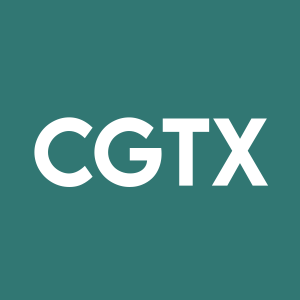Cognition Therapeutics’ Proof-of-Concept Phase 2 SHINE Trial Demonstrates Consistent Improvement in Cognitive Outcomes with Once-Daily Oral CT1812 in Mild-to-Moderate Alzheimer’s Patients
Rhea-AI Summary
Cognition Therapeutics (NASDAQ: CGTX) reported positive results from its Phase 2 SHINE trial for CT1812, an oral treatment for mild-to-moderate Alzheimer's disease. The study showed:consistent cognitive improvement compared to placebo across all measures, with a ~40% mean improvement in cognitive outcomes. CT1812 demonstrated a favorable safety profile with mostly mild or moderate adverse events. Significant changes were observed in neurofilament light chain, a marker of neurodegeneration. The 100mg dose showed particularly promising results, informing future dose selection. These findings suggest that CT1812's amyloid oligomer antagonism mechanism may have potential as a monotherapy or in combination with approved drugs for Alzheimer's and related dementias.
Positive
- CT1812 showed ~40% mean improvement in cognitive measures vs placebo
- Consistent positive changes across cognitive and functional measures
- Favorable safety profile with most treatment-related adverse events mild or moderate
- Significant changes in neurofilament light chain, a marker of neurodegeneration
- 100mg dose showed particularly promising results for future development
- Potential for CT1812 as a monotherapy or in combination with approved drugs
Negative
- CT1812 did not achieve statistical significance on the first of the ordered secondary efficacy endpoints
- Nine patients experienced treatment-emergent LFT increases at the 300mg dose
- Three patients experienced treatment-emergent SAEs in the 300mg group
News Market Reaction
On the day this news was published, CGTX declined 43.88%, reflecting a significant negative market reaction.
Data tracked by StockTitan Argus on the day of publication.
- CT1812 Treatment Showed ~
- Consistent Positive Changes Across Cognitive and Functional Measures -
- Favorable Safety Profile with Most Treatment-Related Adverse Events Mild or Moderate -
- Significant Changes in Neurofilament Light Chain, a Marker of Neurodegeneration -
- Investor Webcast to be Conducted at 8:30a.m. ET to Review Findings -
PURCHASE, N.Y., July 29, 2024 (GLOBE NEWSWIRE) -- Cognition Therapeutics, Inc. (the “Company” or “Cognition”) (NASDAQ: CGTX), a clinical stage company developing drugs that treat neurodegenerative disorders, today reported that participants in the proof-of-concept Phase 2 ‘SHINE’ study (NCT03507790) who were treated with CT1812 for six months showed a consistent trend in cognitive improvement compared to placebo across all cognitive measures including ADAS-Cog 11, ADAS-Cog 13, cognitive composite and MMSE. In addition, there were signals of improvement in functional measures (ADCS-ADL and ADCS-CGIC). Details of these clinical and biomarker findings are reported in posters at the Alzheimer’s Association’s International Conference on July 29, 2024 in Philadelphia, PA.
“The SHINE trial showed that after 182 days of treatment, CT1812 demonstrated evidence of clinical improvements on cognition coupled with a favorable safety and tolerability profile, particularly in the 100mg dose cohort. These findings will inform dose selection and provide a foundation for advancing to the next stage of clinical development,” stated Lisa Ricciardi, president and CEO of Cognition Therapeutics. “We believe these results provide evidence that amyloid oligomer antagonism – a new and distinct mechanism for therapeutic intervention – may have a role as a monotherapy or in a combination with approved drugs for the treatment of AD and related dementias. In terms of percent improvement on evaluated cognitive measures, our results are comparable in magnitude to what was achieved with currently approved antibodies, with great ease of administration as a once daily dose, and less patient burden.”
SHINE enrolled 153 adults with mild-to-moderate (MMSE 18-26) Alzheimer's disease who were randomized evenly (1:1:1) to one of two oral daily doses of CT1812 (100mg or 300mg) or placebo. P-values less than 0.05 were observed on ADAS-Cog 11 and MMSE at Day 98, the midpoint of the study. Through the course of the study, participants in the placebo arm worsened approximately 2.70 points as measured by ADAS-Cog 11 on Day 182. In contrast, CT1812-treated participants declined by an average of 1.66 points, a
“A key objective of this trial was to provide evidence of cognitive benefit potential with CT1812 treatment, which we accomplished,” added Anthony Caggiano, Cognition’s CMO and head of R&D. “We are pleased about the consistent cognitive effect and signals of functional benefit across the entire study. We intend to utilize these findings to enable us to design and power future clinical trials to advance the development of CT1812 in Alzheimer’s disease. We believe that the data supports the advancement of a 100mg dose of CT1812 in additional clinical trials in a mild-to-moderate patient population.”
While we are continuing to analyze the exploratory CSF biomarker program data, the study showed favorable changes in neurofilament light chain (NfL), which is a marker of neurodegenerative disease. These changes were significant at the 300mg dose. We believe this finding supports the understanding of the potential role of CT1812 as a synaptoprotective agent. Other CSF biomarkers not approaching significance include neurogranin, synaptotagmin, SNAP25, pTau, total Tau and GFAP.
The SHINE study achieved its primary objective and demonstrated a favorable safety and tolerability profile, consistent with previous clinical experience. Overall, the percentage of participants experiencing any adverse event (AE) was similar between the pooled CT1812 treatment arms (
In the placebo arm,
At the 300mg dose, nine patients experienced treatment-emergent LFT increases (greater than 3xULN), which subsided after cessation of drug without evidence of serious liver injury. There were no LFT elevations observed in the 100mg dose.
“We are optimistic about the SHINE results and are looking ahead to the results of our SHIMMER trial in mild-to-moderate Lewy body dementia, which is anticipated to read out later this year,” stated Lisa Ricciardi, president and CEO of Cognition Therapeutics. “In addition, we are studying patients with early stage Alzheimer’s disease in our START trial of 540 patients. Another Phase 2 proof-of-concept trial in dry AMD is currently enrolling patients. Cognition is committed to advancing the field of research to provide clinical options for patients with neurodegenerative disease, and we could not have done this without the grant support of over
| AAIC Presentation details | |
| Title: | Clinical Efficacy Results from COG0201: a Randomized, Double-Blind, Placebo-Controlled Phase 2 Study to Evaluate the Safety and Efficacy of CT1812 in Adults with Mild-to-Moderate Alzheimer’s Disease |
| Authors: | Vijverberg EGB, Catalano S, Hamby ME, Grundman M, Iaci J, Devins T, Caggiano AO |
| Date/Time: | July 29, 2024: 8:30 a.m. - 4:15 p.m. Eastern Time |
| Location: | Pennsylvania Convention Center, Philadelphia, PA |
This and Cognition’s other AAIC posters will be available on the Company’s Publication webpage in accordance with the conference’s embargo policy.
Webcast Information
Company management will be joined by an investigator in the SHINE study, Everard (Jort) Vijverberg, MD, PhD of the Alzheimer Center Amsterdam and Neuroscience Amsterdam, who will present an overview of the results. In addition, Martin J. Sadowski, MD, PhD, DSci of New York University School of Medicine will participate as an Alzheimer’s industry expert. A live question and answer session will follow formal presentations. Interested parties may register from the event listing on the Cognition Therapeutics Investor Relations webpage under News & Events or directly by visiting https://lifescievents.com/event/cognition/.
About the SHINE Study
The SHINE study is a double-blind, placebo-controlled Phase 2 clinical trial which enrolled 153 adult patients with mild-to-moderate Alzheimer’s disease. Based on the study design, SHINE was powered to detect a 3-point change in ADAS-Cog 11. The primary endpoint was safety and tolerability and the key secondary endpoint cognitive measure was ADAS-Cog 11. Participants were evenly randomized to receive either placebo or one of two doses of CT1812 (100 mg or 300 mg), which was taken orally daily for six months. The SHINE study was supported by two grant awards from the National Institute on Aging of the National Institutes of Health (NIH) totaling approximately
About CT1812
CT1812 is an experimental orally delivered small molecule oligomer antagonist that penetrates the blood-brain barrier and binds selectively to the sigma-2 (σ-2) receptor complex. Preclinical and clinical data demonstrated that this binding resulted in the displacement of toxic Aβ oligomers. The σ-2 receptor complex is involved in the regulation of key cellular processes such as membrane trafficking and autophagy that are damaged by toxic interaction with Aβ oligomers, oxidative stress and other stressors. This damage to sensitive synapses can progress to a loss of synaptic function, which manifests as cognitive impairment and Alzheimer’s disease progression.
Participants are currently being recruited in the SHIMMER study (NCT05225415) of CT1812 in adults with dementia with Lewy bodies; the START study (NCT05531656) of CT1812 in adults with early Alzheimer’s disease; and the MAGNIFY study (NCT05893537) in adults with geographic atrophy (GA) secondary to dry age-related macular degeneration.
About Cognition Therapeutics, Inc.
Cognition Therapeutics, Inc. is a clinical-stage biopharmaceutical company engaged in the discovery and development of innovative, small molecule therapeutics targeting age-related degenerative disorders of the central nervous system and retina. We are currently investigating our lead candidate CT1812 in clinical programs in Alzheimer’s disease, dementia with Lewy bodies (DLB) and dry age-related macular degeneration (dry AMD). We believe CT1812 and our pipeline of σ-2 receptor modulators can regulate pathways that are impaired in these diseases. We believe that targeting the σ-2 receptor with CT1812 represents a mechanism functionally distinct from other current approaches in clinical development for the treatment of degenerative diseases. More about Cognition Therapeutics and its pipeline can be found at https://cogrx.com
Forward Looking Statements
This press release contains forward-looking statements within the meaning of The Private Securities Litigation Reform Act of 1995. All statements contained in this press release, other than statements of historical facts or statements that relate to present facts or current conditions, including but not limited to, statements regarding our product candidates, including CT1812, and any expected or implied benefits or results, including that initial clinical results observed with respect to CT1812 will be replicated in later trials and our clinical development plans, including statements regarding our clinical studies of CT1812 and any analyses of the results therefrom, are forward-looking statements. These statements, including statements relating to the timing and expected results of our clinical trials, involve known and unknown risks, uncertainties and other important factors that may cause our actual results, performance, or achievements to be materially different from any future results, performance, or achievements expressed or implied by the forward-looking statements. In some cases, you can identify forward-looking statements by terms such as “may,” might,” “will,” “should,” “expect,” “plan,” “aim,” “seek,” “anticipate,” “could,” “intend,” “target,” “project,” “contemplate,” “believe,” “estimate,” “predict,” “forecast,” “potential” or “continue” or the negative of these terms or other similar expressions. We have based these forward-looking statements largely on our current expectations and projections about future events and financial trends that we believe may affect our business, financial condition, and results of operations. These forward-looking statements speak only as of the date of this press release and are subject to a number of risks, uncertainties and assumptions, some of which cannot be predicted or quantified and some of which are beyond our control. Factors that may cause actual results to differ materially from current expectations include, but are not limited to: our ability to successfully advance our current and future product candidates through development activities, preclinical studies and clinical trials and costs related thereto; uncertainties inherent in the results of preliminary data, pre-clinical studies and earlier-stage clinical trials being predictive of the results of early or later-stage clinical trials; the timing, scope and likelihood of regulatory filings and approvals, including regulatory approval of our product candidates; competition; our ability to secure new (and retain existing) grant funding; our ability to grow and manage growth, maintain relationships with suppliers and retain our management and key employees; changes in applicable laws or regulations; the possibility that the we may be adversely affected by other economic, business or competitive factors, including ongoing economic uncertainty; our estimates of expenses and profitability; the evolution of the markets in which we compete; our ability to implement our strategic initiatives and continue to innovate our existing products; our ability to defend our intellectual property; impacts of ongoing global and regional conflicts; the impact of the COVID-19 pandemic on our business, supply chain and labor force; and the risks and uncertainties described more fully in the “Risk Factors” section of our annual and quarterly reports filed with the Securities & Exchange Commission and are available at www.sec.gov. These risks are not exhaustive and we face both known and unknown risks. You should not rely on these forward-looking statements as predictions of future events. The events and circumstances reflected in our forward-looking statements may not be achieved or occur, and actual results could differ materially from those projected in the forward-looking statements. Moreover, we operate in a dynamic industry and economy. New risk factors and uncertainties may emerge from time to time, and it is not possible for management to predict all risk factors and uncertainties that we may face. Except as required by applicable law, we do not plan to publicly update or revise any forward-looking statements contained herein, whether as a result of any new information, future events, changed circumstances or otherwise.
| Contact Information: Cognition Therapeutics, Inc. info@cogrx.com | Casey McDonald (media) Tiberend Strategic Advisors, Inc. cmcdonald@tiberend.com | Mike Moyer (investors) LifeSci Advisors mmoyer@lifesciadvisors.com |








